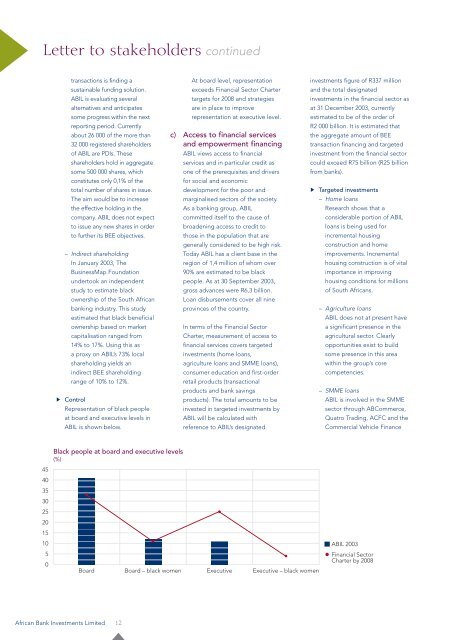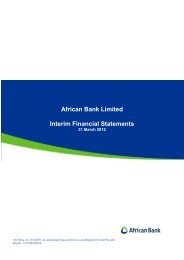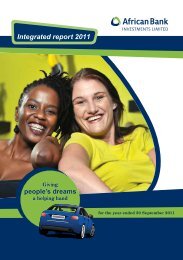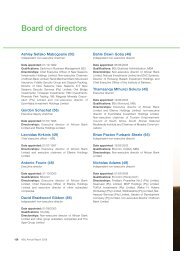Download - African Bank
Download - African Bank
Download - African Bank
Create successful ePaper yourself
Turn your PDF publications into a flip-book with our unique Google optimized e-Paper software.
Letter to stakeholders continued<br />
45<br />
40<br />
35<br />
30<br />
25<br />
20<br />
15<br />
10<br />
5<br />
0<br />
transactions is finding a<br />
sustainable funding solution.<br />
ABIL is evaluating several<br />
alternatives and anticipates<br />
some progress within the next<br />
reporting period. Currently<br />
about 26 000 of the more than<br />
32 000 registered shareholders<br />
of ABIL are PDIs. These<br />
shareholders hold in aggregate<br />
some 500 000 shares, which<br />
constitutes only 0,1% of the<br />
total number of shares in issue.<br />
The aim would be to increase<br />
the effective holding in the<br />
company. ABIL does not expect<br />
to issue any new shares in order<br />
to further its BEE objectives.<br />
– Indirect shareholding<br />
In January 2003, The<br />
BusinessMap Foundation<br />
undertook an independent<br />
study to estimate black<br />
ownership of the South <strong>African</strong><br />
banking industry. This study<br />
estimated that black beneficial<br />
ownership based on market<br />
capitalisation ranged from<br />
14% to 17%. Using this as<br />
a proxy on ABIL’s 73% local<br />
shareholding yields an<br />
indirect BEE shareholding<br />
range of 10% to 12%.<br />
Control<br />
Representation of black people<br />
at board and executive levels in<br />
ABIL is shown below.<br />
Black people at board and executive levels<br />
(%)<br />
Board<br />
<strong>African</strong> <strong>Bank</strong> Investments Limited 12<br />
At board level, representation<br />
exceeds Financial Sector Charter<br />
targets for 2008 and strategies<br />
are in place to improve<br />
representation at executive level.<br />
c) Access to financial services<br />
and empowerment financing<br />
ABIL views access to financial<br />
services and in particular credit as<br />
one of the prerequisites and drivers<br />
for social and economic<br />
development for the poor and<br />
marginalised sectors of the society.<br />
As a banking group, ABIL<br />
committed itself to the cause of<br />
broadening access to credit to<br />
those in the population that are<br />
generally considered to be high risk.<br />
Today ABIL has a client base in the<br />
region of 1,4 million of whom over<br />
90% are estimated to be black<br />
people. As at 30 September 2003,<br />
gross advances were R6,3 billion.<br />
Loan disbursements cover all nine<br />
provinces of the country.<br />
In terms of the Financial Sector<br />
Charter, measurement of access to<br />
financial services covers targeted<br />
investments (home loans,<br />
agriculture loans and SMME loans),<br />
consumer education and first-order<br />
retail products (transactional<br />
products and bank savings<br />
products). The total amounts to be<br />
invested in targeted investments by<br />
ABIL will be calculated with<br />
reference to ABIL’s designated<br />
Board – black women Executive Executive – black women<br />
investments figure of R337 million<br />
and the total designated<br />
investments in the financial sector as<br />
at 31 December 2003, currently<br />
estimated to be of the order of<br />
R2 000 billion. It is estimated that<br />
the aggregate amount of BEE<br />
transaction financing and targeted<br />
investment from the financial sector<br />
could exceed R75 billion (R25 billion<br />
from banks).<br />
Targeted investments<br />
– Home loans<br />
Research shows that a<br />
considerable portion of ABIL<br />
loans is being used for<br />
incremental housing<br />
construction and home<br />
improvements. Incremental<br />
housing construction is of vital<br />
importance in improving<br />
housing conditions for millions<br />
of South <strong>African</strong>s.<br />
– Agriculture loans<br />
ABIL does not at present have<br />
a significant presence in the<br />
agricultural sector. Clearly<br />
opportunities exist to build<br />
some presence in this area<br />
within the group’s core<br />
competencies.<br />
– SMME loans<br />
ABIL is involved in the SMME<br />
sector through ABCommerce,<br />
Quatro Trading, ACFC and the<br />
Commercial Vehicle Finance<br />
ABIL 2003<br />
Financial Sector<br />
Charter by 2008







